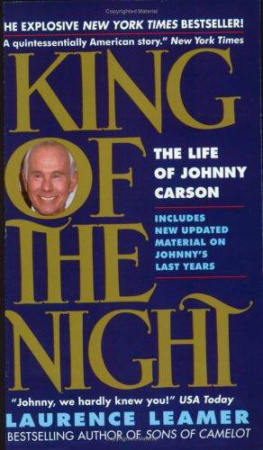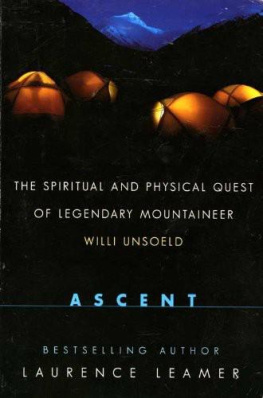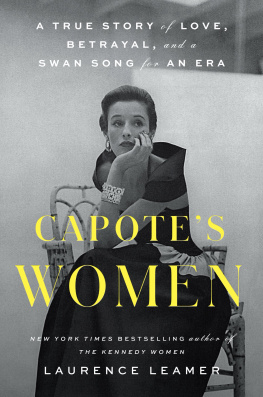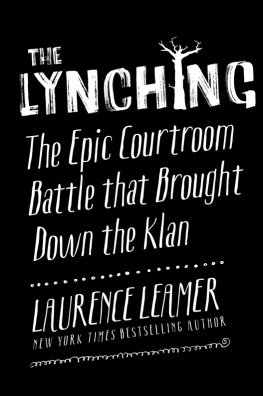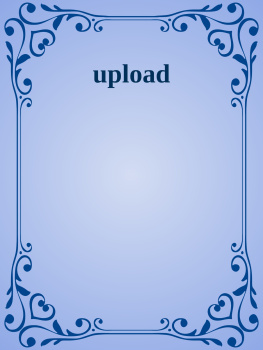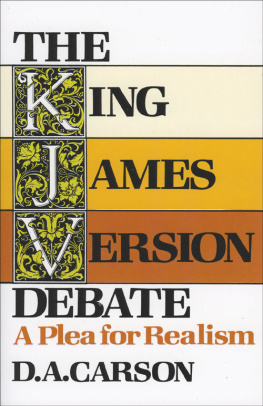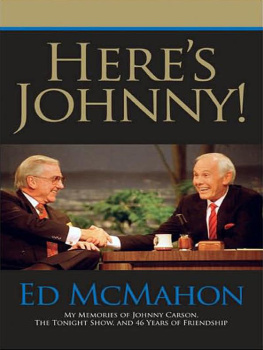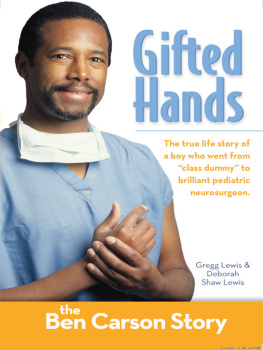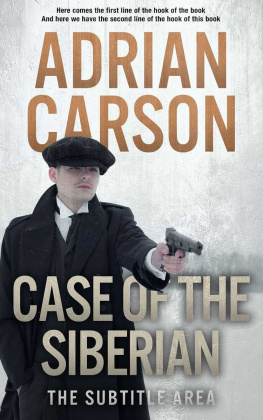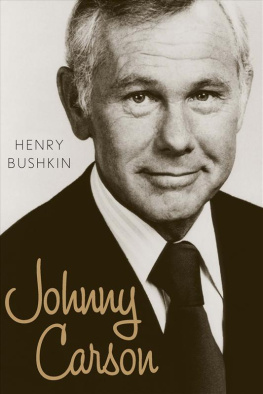THE LIFE
OF JOHNNY
CARSON
LAURENCE LEAMER

TO
RON FRIEDMAN
Contents
L ive from Hollywood! The Tonight Show starring Johnny Carson, the twenty-fifth anniversary. This is Ed McMahon, along with Doc Severinsen and the NBC orchestra, inviting you to join Johnny as we celebrate twenty-five years of late-night entertainment. And now, ladies and gentlemen, HEEEEERES JOHNNY!
Johnny Carson stepped from behind the multicolored curtain wearing a tuxedo. The five hundred guests rose from their seats in Studio 1. They clapped, screamed, whistled, and hooted exuberantly. Johnny walked forward to a star marked on the studio floor. Carl Doc Severinsen salaamed, twirling his hand downward from his forehead. McMahon paid homage too, pressing his hands together and bowing as if to a royal personage.
The camera panned across the audience, capturing snapshots of middle America. A family from Louisiana. A couple from Pennsylvania. A retired man from New Jersey. Two sisters from Seattle. Most of the audience had come to southern California on vacations. They had made this pilgrimage to The Tonight Show as important a part of their itineraries as Disneyland or the Universal Studio tour.
This morning, October 1, 1987, close to a hundred of the guests had been standing in line at the NBC studios in Burbank waiting for tickets when a major earthquake hit Los Angeles. Even that didnt dislodge them. Then this afternoon they had stood in the heat of the San Fernando Valley for two hours or more before ushers let them into this cool sanctuary.
The applause didnt end, but rose from crescendo to crescendo. No one else in show business or public life received such a nightly homage. In an age of disposable celebrities Johnny had come into American homes over five thousand times. He had been seen by more people on more occasions than anyone in American history. He had become a fixture of American life, a part of the cultural furniture. This evening alone, over 21 million people were watching the show.
Johnny exuded boyish impishness, but his face was as weathered as an old Nebraska barn. He smiled warmly, but his posture sent out a far different message. He stood as if he had been jolted backward and had been frozen there, forever pulling away from anyone who got near to him.
At the age of sixty-one, Johnny was the ultimate creature of television. He had begun his career in Omaha in 1949, the first summer that television went on the air in Nebraska. He had worked in Los Angeles and New York as the networks had grown into the most powerful communications medium ever known. Now, the networks had begun to decline, viewers lost to cable networks and videotape recorders. It was unlikely that any other performer would ever have the same hold over the American night.
Johnny finally raised his hands and gently motioned for quiet. That is very sweet of you, he said. Did you intentionally stand, or were you thrown out of your seats?
Johnnys monologue had a rhythm to it that was like a favorite song whose chords brought forth memories of good times. The audience sometimes laughed at the mere sound of his voice.
Oral Roberts felt the quake this morning, Johnny said. That wasnt the punch line, but it was enough to set the audience laughing. Roberts had said that if his flock didnt contribute $4.5 million, God could call him home, presumably a reference to heaven. For months Johnny had been satirizing the faith-healing evangelist. His jokes had helped to make Roberts a figure of widespread derision. Now the mere mention of his name was a joke. Oral turned to his wife in bed and said, Oh, honey, the check must have bounced.
Johnny moved on, line after line, hardly waiting for the laughter to die down. People are not used to seeing me in prime time, he said, gesturing with his hands. Imagine President Reagan tuning in now and saying to Nancy, Well its eleven-thirty, I should have been asleep two hours ago.
In Washington Johnnys nightly political jibes were repeated the next morning all over the capital. If he joked about a politician regularly, it was as ominous a sign as finding a dead fish on your doorstep in Sicily.
Johnny created the illusion of daring. He was, in fact, a comedic politician, attuned to his viewers, leading them wherever they wanted to go. He had unchallenged power as long as he did not attempt to use it. Nightly he listened to the laughs and the groans from the live audience. They told him what was funny and what wasnt, who could be laughed at and who couldnt be.
In America ideas and values changed as quickly as hemlines and hairdos. Believe anything too deeply, strike too rich a characterization, and one was doomed to become pass. Johnny changed his jokes as he changed his wardrobe, never as hip as L.A., never as traditional as Omaha.
Johnnys monologues were part of the Zeitgeist. One day social historians will turn to his quips and commentaries in trying to understand popular American culture in the last third of the twentieth century.
Would you have believed twenty-five years ago that now, today, in 87, wed be seeing condom ads on television? Johnny said, turning to another favorite arena of humor. Now the next time you hear Ed say, On your way home pick up a six-pack, he may not be referring to Budweiser.
In the shows early years Johnny had peppered the program with sexual banter and innuendo rarely heard on television. He was the comedic equivalent of the birth-control pill, helping to popularize Americas sexual revolution. There are no revolutions without casualties; Johnny had made divorce a laughing matter, focusing on his own three ex-wives.
Thank you for being with us, Johnny said as the NBC orchestra cut into The Tonight Show theme and Ed announced the sponsors. The red light went off, and the first barrage of commercials played silently on the monitors.
Johnny stood alone facing the studio audience. For an instant this was no longer Johnny Carson, television star, but a man standing there, and the audience squirmed uneasily. Usually someone shouted out a greeting. Johnny always said a few words.
Thank you, youre going to make this a pleasure, Johnny said, setting off another round of applause. Where were you all this morning about seven-forty-two? he asked, referring to the time of the earthquake. A score of people shouted out the same answer: waiting for tickets for the show.
I felt so calm because of this guy at Channel Four, Johnny said, shaking his head. Kent Shocknek, the morning anchorman, had distinguished himself by ducking under the desk during one of the aftershocks. He dived under the desk and came up d-d-d-d-dont dont dont, Johnny stuttered. Then he mentioned a female reporter on the local station. I think the most frightening thing was seeing Linda Alvarez without her makeup.
Johnny walked over and sat down at his desk next to Ed McMahon. For a program that brought in up to 17 percent of NBCs entire profits, The Tonight Show had a set that was surprisingly modest. The painted backdrop was of a gray stone fence and a Leroy Neiman-like blue sky, speckled with flashes of yellow. In front sat a jungle of potted palms and plants.
Johnnys desk looked as if it could have come from the office of a junior accountant, the chairs from rent-a-furniture. But on television they looked classy.

